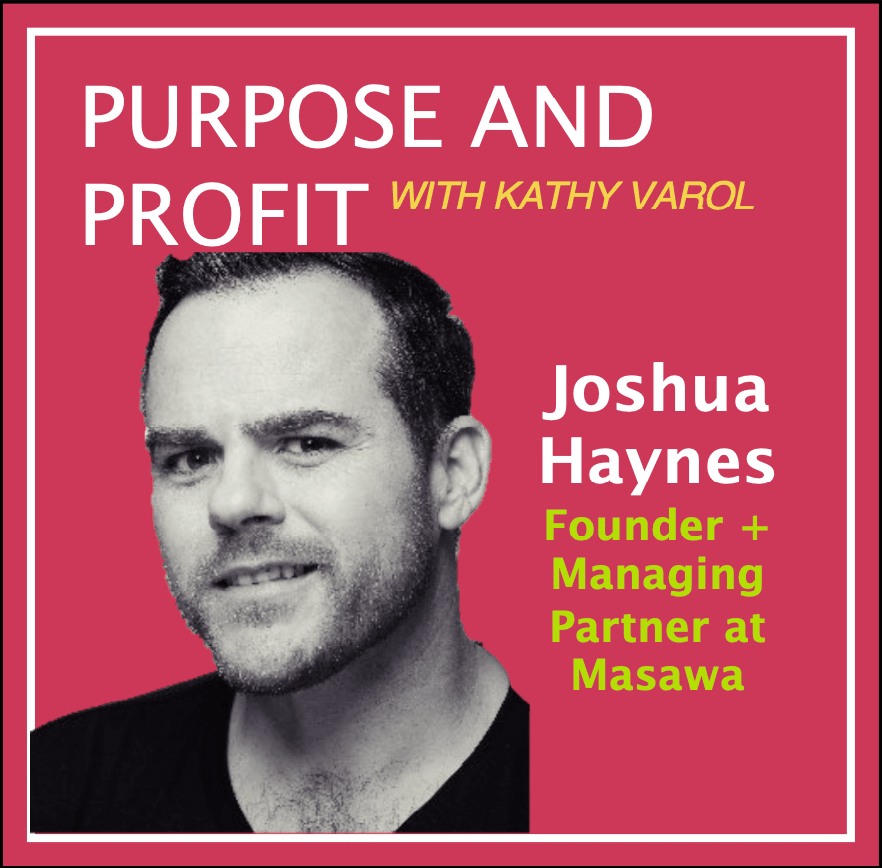Show Notes:
In this episode, I am so excited to speak with Joshua Haynes, a Founder + Managing Partner at Masawa, the mental wellness impact fund. After a long journey learning to approach his own issues of depression, anxiety, and addiction, Joshua founded Masawa to help address mental illness, a silent epidemic that is the leading cause of disability worldwide and costs, in the EU alone, €600 billion a year.
I met Joshua 20 years ago in the Peace Corps. He’s one of those friends that I’ve been continuously impressed by. When I saw he was starting Masawa, I was so excited that I reached out to see if I could help, and Joshua graciously let me support as a strategic adviser from the beginning of this journey. I’m so excited for this discussion to share Masawa, their mission, and what makes them so unique in the investment space.
Sign up for the Masawa newsletter here.
In this episode Joshua and I discuss:
- The early life experiences that sparked Joshua’s passion for social impact.
- The next evolution of venture capital
- The down-side of the hustle-mindset
- The gaps in the traditional investment model that can have a significant impact on ROI
- The secret to creating systemic change that we learned in preschool
- An unexpected blessing from COVID
Takeaways from this episode:
- An organization’s health hinges on its culture. The mental health of employees, when aggregated, is the mental health of the organization. It shapes the culture and tone of the organization. Senior leaders have an out-weighted influence on culture, which means founders’ and CEO’s mental health can set the tone for an organization in a positive way, or in a toxic way.
- The importance of continuing to normalize the cultural conversation around mental health. In the workplace, we can read the best books and talk about psychological safety all we want. But the real shift happens through implementation. Talking openly and being vulnerable about who we are as leaders and founders. Setting an example for the normalized change we’re trying to drive.
- Our most important long-term asset is mental health, and mental wellness is currently one of the greatest global challenges. It affects every country, it affects every community. Depression alone is the number one cause of disability. Not even looking at the human perspective, from a business perspective companies not taking care of employees has a huge cost to the bottom line. Not only from absenteeism, when they can’t show up to work because of their mental health issues, but presenteeism, where they’re at work but they’re not able to do their intended role.
References:
- Masawa
- Zebras unite
- Effective altruism movement
- Studies show that 50% of entrepreneurs experience mental health issues, and a full 94% of founders report symptoms of burnout, anxiety, and panic attacks.
- Mental illness is the leading cause of disability worldwide (WHO, 2020).
- 1 in 5 people are set to develop a mental health condition in the course of their lifetime (WHO, 2019).
- Around 1-in-7 people globally (11-18 percent) have one or more mental or substance use disorders.
- Globally, more than 264 million people of all ages suffer from depression. Bipolar disorder affects about 45 million people worldwide (WHO, 2019).
- In the US, mental illness affects almost 20% of adults (NIMH, 2017).
- 50% of mental health problems are established by the age of 14 (Arch Gen Psychiatry, 2005).
- 1 in 5 deaths among 15 to 19-year-olds in the EU are caused by intentional self harm (Eurostat, 2017).
- The health of family caregivers taking care of someone with a mental health issue is reported to be 34% worse than of non-caregivers (National Alliance for Caregiving and AARP, 2015).
- In Africa, there is a treatment gap of up to 90% (UCT, 2018).
- In Europe, about 50% of major depressions are untreated (WHO, 2012).
- Among children and adolescents with a diagnosed mental health disorder , only 25-35% have access to treatment.
- There is a rapidly growing number of startups active in the mental health sphere. There are more than 1000 mental health startups in the EU and US alone, most of them founded after 2015.

